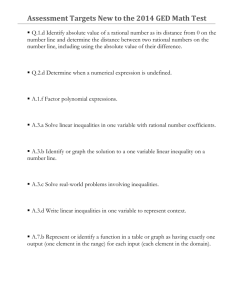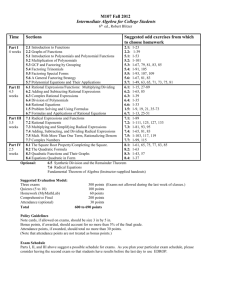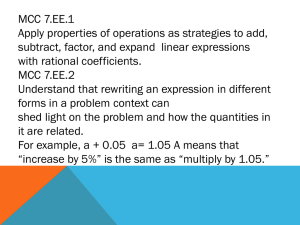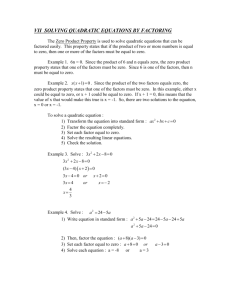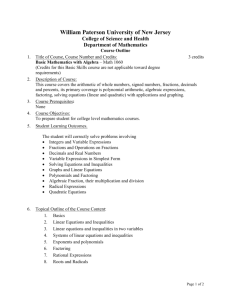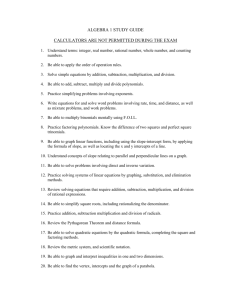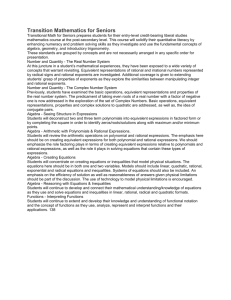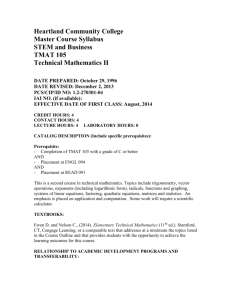MATH 094 - Baton Rouge Community College
advertisement
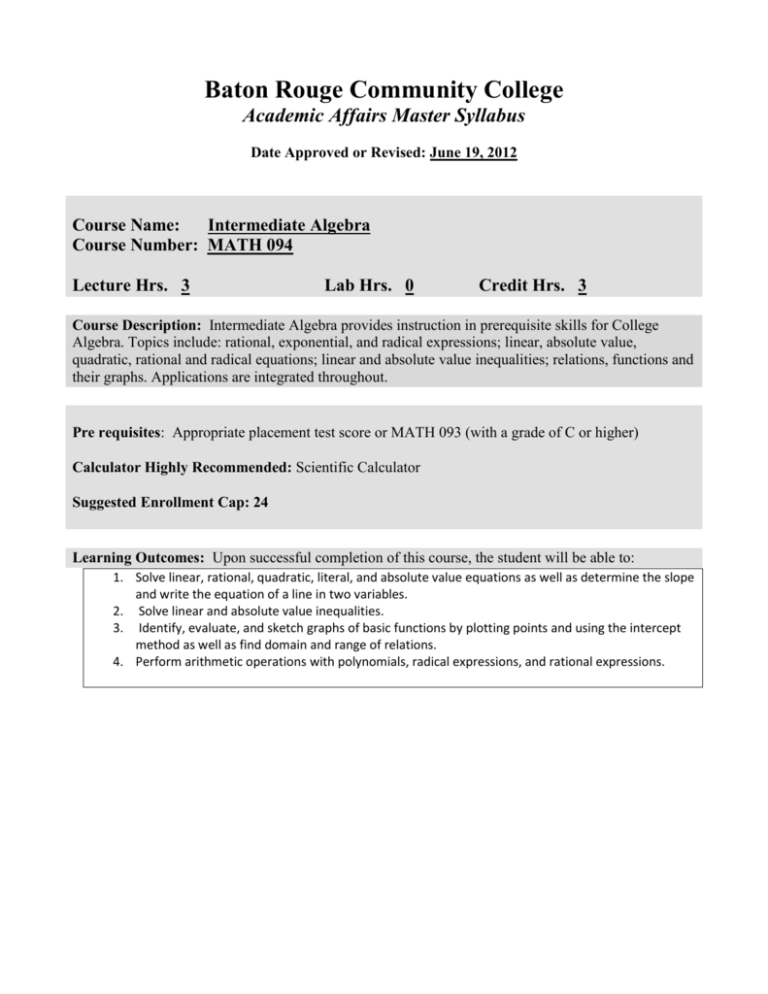
Baton Rouge Community College Academic Affairs Master Syllabus Date Approved or Revised: June 19, 2012 Course Name: Intermediate Algebra Course Number: MATH 094 Lecture Hrs. 3 Lab Hrs. 0 Credit Hrs. 3 Course Description: Intermediate Algebra provides instruction in prerequisite skills for College Algebra. Topics include: rational, exponential, and radical expressions; linear, absolute value, quadratic, rational and radical equations; linear and absolute value inequalities; relations, functions and their graphs. Applications are integrated throughout. Pre requisites: Appropriate placement test score or MATH 093 (with a grade of C or higher) Calculator Highly Recommended: Scientific Calculator Suggested Enrollment Cap: 24 Learning Outcomes: Upon successful completion of this course, the student will be able to: 1. Solve linear, rational, quadratic, literal, and absolute value equations as well as determine the slope and write the equation of a line in two variables. 2. Solve linear and absolute value inequalities. 3. Identify, evaluate, and sketch graphs of basic functions by plotting points and using the intercept method as well as find domain and range of relations. 4. Perform arithmetic operations with polynomials, radical expressions, and rational expressions. Assessment Measures: A comprehensive departmental final exam will be given Instructor created materials Information to be included on the Instructors’ Course Syllabi: Disability Statement: Baton Rouge Community College seeks to meet the needs of its students in many ways. See the Office of Disability Services to receive suggestions for disability statements that should be included in each syllabus. Grading: The College grading policy should be included in the course syllabus. Any special practices should also go here. This should include the instructor’s and/or the department’s policy for make-up work. For example in a speech course, “Speeches not given on due date will receive no grade higher than a sixty” or “Make-up work will not be accepted after the last day of class.” Attendance Policy: Instructors may want to add additional information in individual syllabi to meet the needs of their courses. General Policies: Instructors’ policy on the use of things such as beepers and cell phones and/or hand held programmable calculators should be covered in this section. Cheating and Plagiarism: This must be included in all syllabi and should include the penalties for incidents in a given class. Students should have a clear idea of what constitutes cheating in a given course. Safety Concerns: In some programs this may be a major issue. For example, “No student will be allowed in the safety lab without safety glasses.” General statements such as, “Items that may be harmful to one’s self or others should not be brought to class.” Library/ Learning Resources: Since the development of the total person is part of our mission, assignments in the library and/or the Learning Resources Center should be included to assist students in enhancing skills and in using resources. Students should be encouraged to use the library for reading enjoyment as part of lifelong learning. Student Grievance Procedure: All student appeals/complaints must first be brought to the attention of the instructor outside of class for possible resolution. If the situation can’t be resolved, it is then to follow the following: 1. Submit to the Chair of the Mathematics Department 2. Submit to the Associate Dean of the Division of Math and Science. 3. If the issue is still not resolved, a discussion between all parties involved will be facilitated by the dean (student, instructor, chair, associate dean, dean) 4. Submit to the Student Appeals and Exception Committee EXPANDED COURSE OUTLINE: 1. Review of Basic Algebraic Concepts (Section 2) a. Linear Equations in One Variable (Section 2.1 Objectives 1 – 4) b. Applications of Linear Equations in One Variable (Section 2.2 Objectives 1 – 2) c. Literal Equations (Section 2.3 Objectives 1 -2 ) 2. More Equations and Inequalities (Section 2) a. Linear Inequalities in One Variable (Section 2.4 Objectives 1 – 3) b. Absolute Value Equations (Section 2.6 Objective 1) c. Absolute Value Inequalities (Section 2.7 Objectives 1,2) 3. Introduction to Functions (Section 3) a. b. c. d. e. f. g. Find Domain and Range of Relations (Section 3.2 Objectives 1, 4) Identify Functions (Section 3.2 Objective 2) Evaluate Functions (Section 3.2 Objective 5) Graphs of Basic Functions (Section 3.1 Objectives 1 – 4) Find Intercepts of Linear Functions (Section 3.3 Objectives 1 – 3) The Slope of a Line (Section 3.4, Objectives 1,2, and 4) Equations of Lines (Objectives: 1, 2,3 , and 4) 4. Systems of Equations (Optional) a. Solving Systems of Equations in Two Variables (Section 4.1, Objectives 1 – 4) 5. Polynomials (Section 5) a. b. c. d. e. f. g. h. i. Exponents and Scientific Notation (Section 5.1 All) More Work with Exponents and Scientific Notation (Section 5.2 , All) Polynomials and Polynomial Functions (Section 5.3, Objective 3 – 5) Multiplying Polynomials (Section 5.4, Objectives 1-5) Greatest Common Factor (Section 5.5 Objective 1,2) Factoring by Grouping (Section 5.5 Objective 3) Factoring Trinomials (Section 5.6 Objective 1,2) Factoring Binomials (Section 5.7 Objectives 1 – 3) Solve Equations by Factoring (Section 5.8 Objective 1) 6. Rational Expressions (Section 6) a. b. c. d. Simplify Rational Expressions (Section 6.1 Objective 1, 2) Multiplication and Division of Rational Expressions (Section 6.1 Objective 3,4) Addition and Subtraction of Rational Expressions (Section 6.2 Objective 1 - 3) Solve Rational Equations (Section 6.5 Objective 1) 7. Radicals and Complex Numbers (Section 7) a. Definition of an nth-Root (Section 7.1 Objective 4) b. Rational Exponents (Section 7.2 Objective 1 - 4) c. Properties of Radicals (Section 7.3 Objective 1 - 3) d. Addition and Subtraction of Radicals (Section 7.4 Objective 1) e. Multiplication of Radicals (Section 7.4 Objective 2) f. Rationalization (Section 7.5 Objective 1 - 2) g. Complex Numbers (Section 7.7 Objective 1) (only as needed to simplify complex solutions to Quadratic Equations) 8. Quadratic Equations (Section 8) a. Square Root Property (Section 8.1 Objective 1)

